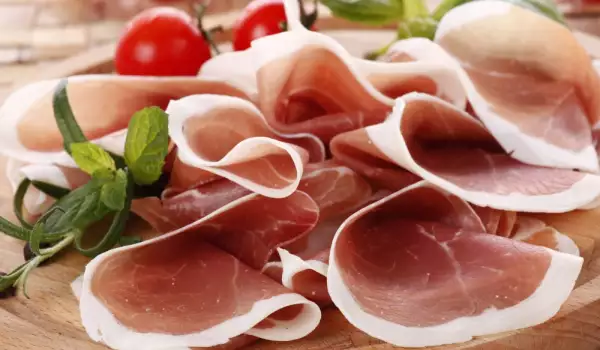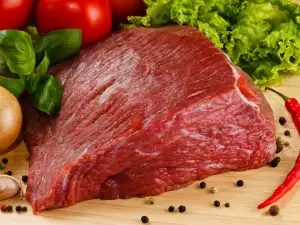Prosciutto is a world renowned Italian delicacy delight for the taste buds, the production is a trademark of Italians. Prosciutto is a type of ham made from a pork leg, which is marinated and aged in specific conditions, being imposed with salt and aromatic herbs.
Prosciutto San Daniele - this is one of the most famous and prestigious types of ham. Its taste is exquisite, sweet, unlike the others which are more spicy and salty. The best season for production is winter, and the best quality prosciutto is produced in the San Daniele area. This is the area around the banks of the Tagliamento River, which is believed to be the best environment to make this gourmet temptation.
Pigs that are used are heavy pigs, which means that the animals are fed a special diet. They weigh up to 160 kg and are aged not less than nine months. From birth, the animal is marked with tattoos on its legs. For the slaughter of pigs, a special certificate is issued.
The preparation process can take anywhere from nine months to a year and a half, depending on how big the ham is. The first step is cleaning and processing the meat with salt, then leave it for two months. During this period, gently press it a little bit to drain the blood from the meat. Care must be taken not crushed the bone. When dry, move to a ventilated area.
History of prosciutto
The origin of prosciutto dates from time immemorial, and probably started from the Bronze Age. The first documents are from the time of the Celts, who introduced the practice of preserving meat with salt and Romans, who feasted with pigs, sausages and hams. Roman soldiers took their long trips with large amounts of salted pork meat and ham.

In the past, pigs were bred outdoors in forests and wetlands. Harvesting them only took place in winter and they were fed with acorns collected from special forests. After the invasion of the Lombards /569/ the social status of pig masters was equivalent to that of other master craftsmen. An interesting fact is that the cost of these forests is expressed in the so-called. "Pork equivalent."
The Gauls were also very adept at drying pork. Slaughter of pigs occurred during the winter, not later than February 15 in order to use the low temperatures, salting and drying with the winds of spring. This is true to this day.
Composition of prosciutto
Unsaturated fat in the prosciutto reaches 75%, equal to fish and beef. Moreover, the delicacy is rich in amino acids and essential elements such as zinc and iron. The average salt content in the ham is about 6%. The use of additives in ham is forbidden.
Selecting and storing prosciutto
This excellent ham can be found in major grocery chains and specialist Italian shops. The price may be high, though. Note the label - it should be mentioned expiry date and manufacturer. Ham is stored in the fridge.
Culinary uses of Prosciutto

After a long and difficult process of handling, many ham connoisseurs are scattered around the world. Its very attractive appearance, soft pink flesh and snow white meat are prepared for the coming joy. Recipes with Prosciutto are endless. Always cut it very thinly, to fully enjoy the amazing taste.
No need to cook prosciutto, because it is dry. Usually, strips are added at the end of the individual course preparation. You can eat a piece of delicious ham with parmesan cheese and a glass of red wine - what better appetizer than that?
Prosciutto is used to make pizzas, rolls wrapped with strips of prosciutto and cheese and celery. It is a component of many fresh salads with arugula and goat cheese. Classic combination is one of figs, prosciutto and goat cheese.
Naturally one can not miss the composition of mixing it with delicious pasta with spinach, for example. Wrap asparagus with prosciutto and lightly fry it in preheated oil, aming great and exquisite rolls, which can surprise your guests.
Benefits of prosciutto
Zinc and iron contained in prosciutto are important for maintaining the health and function of the body. Iron plays a key role in energy production, the immune function is also dependent on it. Zinc helps balance blood sugar, supports the sensitivity of taste and smell, support the immune system.



















Comments